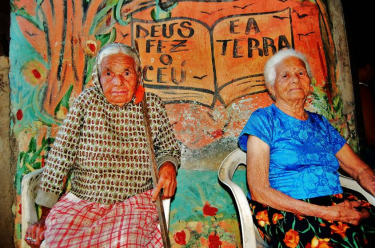Written by Sara Moreira
One of the oldest slave descendent communities in Brazil, Quilombo Rio dos Macacos, where around 50 families live, has a date for eviction: March 4, 2012. The claim for the land comes from the Navy of Brazil, that intends to broaden a condo for its officers in that territory, in the border area between Salvador and Simões Filho, state of Bahia.
Several social movements have demonstrated against [pt] the “flagrant disrespect for fundamental human rights”, motivated by what some describe as “institutional racism” [pt].
Among the community [pt] there are “people older than 100 years who were born in the same place where they have lived until now”, and who [pt] say that “they won't allow themselves to be evicted”.
In a short documentary published by the collective Bahia na Rede, members of the community complained [pt] “that [they] are trapped in the area whose access is controlled by the military, facing difficulties in coming in and going out, and suffering daily threats of eviction and aggression in an area which is recognized by the Palmares Foundation [a public institution linked to the Ministry of Culture that aims to promote and preserve the afro-brazilian culture] as quilombola's territory”:
sob regime de tensão e violência, aterrorizados: [os quilombolas] garantem que passam a noite acordados com medo de morrer (soldados passeiam à noite toda pelas suas roças) e têm medo de sair pois quando voltar poderão encontrar a casa derrubada. O acesso à comunidade é controlado pelo portão de entrada da Vila Militar, um condomínio de residências de sub-oficiais da Marinha; e os conflitos vêm, sobretudo, com a construção desta Vila, a partir de 1971. As famílias da área foram removidas e desalojadas. Hoje estão proibidas de plantar e sendo expulsas da área.
Under a regime of tension and violence, terrified: [the quilombolas] ensure that they spend the night awake afraid to die (soldiers walk all night around their crops) and are afraid to go out because when they are back they can find the house torn down. The access to the community is controlled by the entrance gate of the Military Village, a housing condo for sub-officers of the Navy, and the conflicts [have] come especially with the construction of this town, since 1971. The families of the area were removed and displaced. Today they are forbidden to plant and are being expelled from the area.
Land is a right
Descendants of original peoples from Africa who, during colonialism, were taken from their land to become slaves in Brazil, the Quilombolas now see themselves under threat of losing their homes again, despite their right to the land they inhabit enshrined in the constitution.
The representative of the Rural Workers' Lawyers Association (AATR), Pedro Diamantino, in an “Act in support of the quilombola Rio dos Macacos community”, which took place on February 6, explained [pt] the legal framework:
o artigo 68 das disposições transitórias da CF [Constituição Federal] garante “aos remanescentes das comunidades dos quilombos que estejam ocupando suas terras” a propriedade definitiva, porém este artigo até hoje não foi regulamentado, o que gera instabilidade jurídica. A demarcação de terras quilombolas atualmente está lastreada no decreto federal 4887/2003, que é um instrumento jurídico insuficiente para garantir a posse definitiva da terra.
The Article 68 on the transitional provisions of the CF [Federal Constitution] guarantees “the remnants of quilombo communities who are occupying their lands” definitive ownership, but this article has not yet been regulated, which creates legal instability. The demarcation of quilombola's lands is currently backed in Federal Decree 4887/2003, which is a legal instrument that is insufficient to ensure the final possession of the land.
tramitam na Câmara dos Deputados um projeto de emenda à Constituição Federal (CF) que pretende avocar para o poder legislativo a regularização das terras quilombolas – hoje à cargo da Fundação Palmares e do Incra – e outros projetos que pretendem anular todos os decretos em favor dos quilombos.
A draft amendment to the Federal Constitution (FC) is being processed in the Chamber of Deputies; it intends to call back the regularization of the quilombola's lands - nowadays under the responsibility of Palmares Foundation and INCRA - and other projects that aim to revoke all the decrees in favor of quilombos.
The lands occupied by the Quilombo Rio dos Macacos was donated by the city hall of Salvador to the Brazilian Navy in mid 1960. At the time, the existence of inhabitants was registered [pt] and the Navy was made responsible for any compensation that might arise from the transfer of land.
By the end of 2009, the Navy presented a proposal of eviction to the Justice. One year later, the Judge of the 10th Circuit Court of the Judicial Section of Bahia granted [pt] it; the eviction was scheduled for November 4, 2011 - exactly one month after the certificate of recognition of Rio dos Macacos as Quilombola Community was published on the Diário Oficial da União, from which a Self Recognition Certificate came out. The order of eviction ended up being postponed [pt] for 4 months by the Federal Justice, but until today March 4, 2012, remains as the date for expulsion.
We Are Quilombo Rio dos Macacos

- We are Quilombo Rio dos Macacos. Public domain.
The year started with a protest outside the wall that surrounds the Naval Base, and where President Dilma Rousseff was spending holidays. Tania Lobo published on Youtube a set of photos of the protest showing the signs held by the demonstrators, which read “Are you going to allow this President?”, “Navy wants to expel Quilombola Rio dos Macacos community”, “Community (…) asks for just, legal and immediate solution”, and “Navy forbids INCRA to enter the community Rio dos Macacos”.
Meanwhile, solidarity actions have multiplied, such as the collective declaration [pt] “Somos Quilombo Rio dos Macacos” (We Are Quilombo Rio dos Macacos), by several public figures, musicians, poets and activists from Bahia's movements.
A page on Facebook with the same name, as well as many blogs, have republished the community's manifesto, which demands for:
providências imediatas por parte da Presidenta da República e pelo Ministro da Defesa, pelo fim da violação dos direitos humanos, pelo garantia dos direitos quilombolas e pela imediata regularização fundiária do Território da Comunidade Quilombola Rio dos Macacos
Immediate action by the President of the Republic and the Minister of Defence, for the end of human rights violations, for ensuring the rights of quilombolas and for the immediate regularization of the Territory of the Quilombola Community Rio dos Macacos
The 2011 report on Quilombola's Land [pt], published by the Comissão Pró-Índio from São Paulo on February 15, reveals that during the first year of Dilma Rousseff's government, only one Quilombola Land was titrated by the federal government, and that “the score of quilombola lands titrated in Brazil has reached 110, which means that only 6% of the estimated 3000 quilombola communities in the country have the title of their land.”


No comments:
Post a Comment